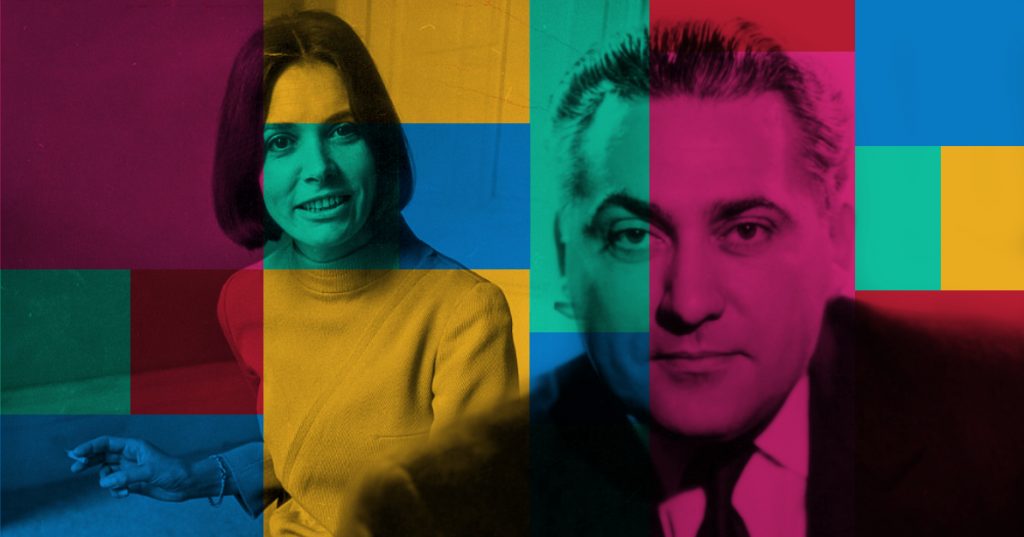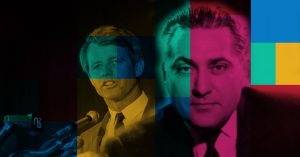Talkers get less money than actors and the results suggest the reason
Critic Milton Shulman goes for Late Night Line-Up and The Question Why?

TALK IS CHEAP. No one is more conscious of the truth of that maxim than TV executives.
Talkers get less money than actors. They need no elaborate sets to back them up. Studios can be small and rehearsal time almost minimal.
There is no need to supplement them with original film material which entails the expense of large film crews. There is little to be paid in the way of hotel or travelling expenses.
A half-hour talk programme ran be laid on for about one-tenth the cost of a half-hour drama or documentary. Transmitting 30 minutes of conversation that costs £400 [£5,945 in today’s money allowing for inflation – Ed] instead of a play that costs £4,000 [£59,450] can save a TV company, on one programme alone, something like £175,000 [£2.6m] in a single year.
Another advantage of talk from a TV executive’s point of view is that he can use it to substantiate his claim that he is fulfilling his serious and cultural responsibilities to the medium. And it doesn’t cost him much.
Thus in their annual reports, the commercial companies can include long lists of dons, philosophers, authors, artists, composers, editors, scientists, who have appeared on their programmes which helps provide a smokescreen of social responsibility.
For minimal costs the maximum amount of goodwill is achieved.
Little
With such obvious benefits to be gained, it is surprising how little thought, imagination and effort goes into the average talks programme. This is one area of TV where it costs no more to make a good programme than it does to make a bad one.
TV is, of course, largely the art of the cheap budget. Since the BBC is being starved of its additional fee and since the commercial companies are being faced with the increased expense of introducing colour, it is perhaps natural that talk programmes should begin to proliferate on all channels.
If late on Sunday you switch from BBC-2 to BBC-1 to IIV, you will get no surcease from talk, talk, talk. The BBC has just introduced a regular Monday evening show of talk conducted by Michael Aspel. The new London TV companies promise us Eamonn Andrews talking three nights a week and David Frost talking another three nights a week.
Watching these programmes I am constantly impressed by the affinity their producers have with the Bourbons who learned nothing and forgot nothing.
We critics are constantly bing abused for having nothing constructive to offer the toilers in the electronic vineyards of TV.
But it is clear from these latest specimens of cauliflower TV — aimed to assault the ear rather than the eye – that elementary errors pointed out time and time again by critics are repeated by new waves of talks producers as if they were either too stubborn to take good advice, too arrogant to learn from experience or loo lazy to read.
Slavish
The Sunday night chat on BBC-2’s Late Night Line-Up, for example, is modelled with almost slavish fidelity on the format of the old Brains Trust but without any apparent understanding of what made that programme a success and this one a failure.
The formula for good conversation on TV is little different from that faced by every successful hostess organising a dinner party. There must not be too many guests; they must have areas of common interest; the bore must be immediately recognised and neutralised.
Any ideal dinner party, too, must not be composed of complete strangers uncomfortably trying to get on each other’s wavelengths and rarely succeeding before the brandy stage has been reached.
There must be some guests who know each other so well that they can exchange gossip, banter and abuse without feeling self-conscious or inhibited.
Unease
Instead of a team of anchormen like Commander Campbell, Huxley and Joad in the original Brains Trust or Michael Foot, A. J. P. Taylor and Lord Boothby in Free Speech — and these two were undoubtedly the best talk programmes yet conceived for either radio or TV – Late Night Line-Up’s Sunday conversation recruits four new faces every week and rarely has a group so regularly communicated such unease.
Not only does this motley assembly seem to have little in common, but it is only with a great deal of effort that they give any impression of being remotely interested in most of the questions they are asked to talk about.
Thus Yehudi Menuhin discussing the nation’s dedication to sport prefaced his remarks by omitting he knew very little about sport.
Irene Worth, asked to talk about the problem of amateurism in the Civil candour said: “I don’t know. I have no views about this”.
Now what is the basis of assembling Yehudi Menuhin, Sir Edward Boyle, Irene Worth and Roger McGough [respectively, a violinist, the Tory MP for Birmingham Handsworth, an actress and a poet] for a conversation on TV? I can think of only one subject they have in common — music – and possibly drama. Then why are they asked to chat about sport or the Civil Service or heredity?
On the other hand, the following week Willi Frischauer, whose field is politics and journalism, had to artificially convert himself into an authority on pop music and the Beatles.
Drab
Again there seemed nothing to link Willi Frischauer, an exuberant and likeable talker on his own subject, with the drab threesome he was trying to stimulate into something resembling a concerned reaction.
On this programme no one gets angry, no one seriously contradicts anyone, no one seems involved and no one really cares. One has the impression they are all there for their chat fees and little else. It is gentility run riot!
Michael Dean and Joan Bakewell, as the chairmen, seem obsessed with the esoteric and cultural aspects of life to the exclusion of almost everything else. When the panel are asked a question like: “Does the future of culture lie in the development of vernacular art?” not only do the guests seem to sigh a mental groan but the sound of sets switching off throughout the land must be deafening.
Another producer who seems to have learned nothing from the experience of other talk programmes is Christopher Martin, who is responsible for Malcolm Muggeridge’s new Sunday evening programme, The Question Why?
Anxious
Claiming for itself a reflective aim in which such profound questions as the basis for our need for wealth, a longer life, more happiness, would be asked and probed, this programme made the elementary mistake of filling the studio with about 30 people all anxious to get at each other’s throats.
Not only is it insulting to invite so many people to take part in a programme in which their average speaking time can only be about a minute and a half each, but when the topic is to be something as complicated and combustible us the right to strike it is courting verbal chaos to jam so many participants into the same studio.
The Hyde Park Speakers’ Corner format has been tried time and time again on TV — Man Alive only recently had to abandon it — and always the result has been disastrous.
Malcolm Muggeridge trying to discipline the storm of shouts, interjections, insults looked like some benign King Canute stemming the incoming tide with the pat of his hands.
If the questions Mr. Muggeridge wants to ask cannot be answered by civilised talkers in a civilised atmosphere, given a civilised amount of time for reflection and argument, then I’m afraid he has no business asking them at all.



